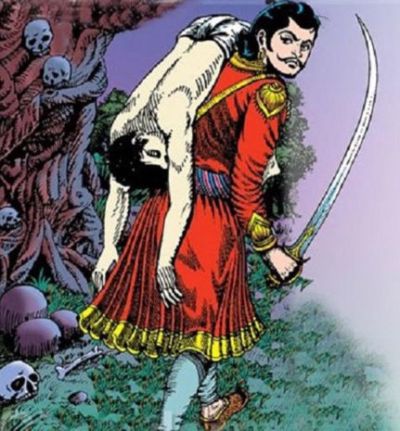आरब्धे हि सुदुःकरे ऽपि महतां मध्ये विरामः कुतः?
How can great men leave in the middle of a task that they have begun, even though it be very difficult?

अष्टादशो वतेालः
The Eighteenth Story
The woes of Candrasvāmin
ततः पितृवने तस्मिन् क्रव्यभक्षिभिर् आवृते ।
ज्वालाविलोलरसनैर् भूतैर् इव चिताग्निभिः ॥ १२,२५.१ ॥
गत्वैव तस्याम् अक्षोभ्यः क्षपायां शिंशपातरुम् ।
स त्रिविक्रमसेनस् तम् आससाद पुनर् नृपः ॥ १२,२५.२ ॥
तत्रापश्यच् च वेतालविकृतान् सदृशाकृतीन् ।
उल्लम्बमानान् सुबहून् प्रेतकायान् अशङ्कितम् ॥ १२,२५.३ ॥
अहो किम् एतत् किं वान्यन् मायी कालं क्षिपत्य् अयम् ।
वेतालो मे न वेद्म्य् एषां ग्राह्यं येनेह भूयषाम् ॥ १२,२५.४ ॥
असिद्धार्थस्य चेद् रात्रिर् इयं मम गमिष्यति ।
ततो वह्निं प्रवेक्ष्यामि न सहिष्ये तु हास्यताम् ॥ १२,२५.५ ॥
इति चिन्तयतस् तस्य राज्ञो विज्ञाय निश्चयम् ।
सत्त्वतुष्टः स वेतालः स्वमायां संजहार ताम् ॥ १२,२५.६ ॥
ततो दृष्ट्वैकम् एवात्र वेतालं नृकलेवरे ।
अवतीर्य गृहीत्वांसे स प्रतस्थे पुनर् नृपः ॥ १२,२५.७ ॥
प्रक्रामन्तं च तं भूयः स वेतालो ऽभ्यभाषत ।
राजन् नोद्विजसे चित्रं तद् इमां मे कथां सृणु ॥ १२,२५.८ ॥
The cremation-ground was a terrifying scene, with flames of the fires of the funeral pyres leaping into the sky, resembling the greedy tongues of demons…undaunted, King Vikram continued to the banyan tree.
There, unexpectedly, he saw many corpses, all looking like each other, hanging from the branches. They all seemed to be possessed by Vetālas.
The king said to himself…
“Oh, what is the meaning of this? Is this Vetāla trying to delay me by showing me black magic? I don’t know what corpse to take with me, and if I take the wrong one, or don’t accomplish this task by dawn, then I better give up my life rather than face the disgrace…”
Pleased by his determination and resolve, the Vetāla stopped the illusion, so that King Vikram could spot the corpse that he needed to take way.
The King then brought down the corpse, threw it across his shoulders, and started to walk back.
As he walked, the Vetāla said…
“Oh king, your determination is praiseworthy! Here, let me tell you a story…”
अस्ति गौरीतपःक्लेशवृतेन त्रिपुरारिणा ।
असामान्यगुणोत्कर्षलुब्धेनेव स्वयंवृता ॥ १२,२५.९ ॥
भोगवत्यमरावत्योस् तृतीयोज्जयिनी पुरी ।
उदारसुकृतप्राप्यनानाभोगोपबृंहिता ॥ १२,२५.१० ॥
यस्यां स्तब्धत्वकार्कश्ये कुचेषु वरयोषिताम् ।
तासाम् एव भ्रुवोर् भङ्गो लोचनेषु च चापलम् ॥ १२,२५.११ ॥
तमो निशासु वक्रत्वं यस्यां कविवरोक्तिषु ।
मदो दन्तिषु जाड्यं च मुक्तामलयजेन्दुषु ॥ १२,२५.१२ ॥
तस्यां चन्द्रप्रभाख्यस्य राज्ञो ऽमात्यो बहुश्रुतः ।
देवस्वामीत्य् अभूद् विप्रो भूरियज्ञो महाधनः ॥ १२,२५.१३ ॥
तस्य कालेन तनयश् चन्द्रस्वामीत्य् अजायत ।
सो ऽधीतविद्यो ऽपि युवा द्यूतैकव्यसनो ऽभवत् ॥ १२,२५.१४ ॥
एकदा च द्विजसुतश् चन्द्रस्वामी स कांचन ।
द्यूतकारमहाठिण्ठां द्यूतेन क्रीडितुं ययौ ॥ १२,२५.१५ ॥
आश्लिष्यामः कम् अत्रेति विपद्भिर् इव वीक्षितुम् ।
विक्षिप्तैः कृष्णशाराभैर् नेत्रैर् अक्षैर् निरन्तराम् ॥ १२,२५.१६ ॥
कः सो ऽस्ति न श्रियं यस्य हराम्य् अप्य् अलकापतेः ।
इतीव तन्वतीं नादान् द्यूतकृत्कलहस्वनैः ॥ १२,२५.१७ ॥
There is a city in Bhāratvarshā, called Ujjayinī, which is inferior only to Amarāvatī and Bhogavatī , which Śiva, who was pleased by the tapasyā of Gaurī, being in love with it’s extraordinary energy, himself selected as his habitation.
There are various pleasures found in this city, inhabited by only those who deserve to live in a place that matches swargā in splendor.
In this city, कार्कश्यं (hardness) is seen only in the breasts of women, nor in the words of it’s inhabitants, चापलं (restlessness) is only in the eyes, not in the mind, and भङ्गिः (crookedness) is only in the eyebrows, not in character.
In this city, तमः (darkness) exists only in the nights, and not in the minds of it’s people, वक्रत्वं (alankāra) only in poetic compositions and not in the intentions of it’s inhabitants, मदः (intoxication) only in elephants and not as arrogance in people, जाड्यं (coldness) in peals, sandalwood and moonlight, and not in attitudes.
In this city lived Devasvāmin, a learned Brahmin, one who possessed great wealth and fame. He had obtained much praise from king Candraprabha of Ujjayinī, and was well respected.
He had a son named Candrasvāmin, who, though he had studied in a gurukulā, had grown up to develop the vice of gambling.
One day, this son of Devasvāmin entered a gambling den, to fulfill his desire to gamble.
The tumbling dice of the hall seemed to be continuously scouting the scene with their rolling black eyes, and saying to themselves…
“Who shall we catch today?”
And the loud noises of the fights of the gamblers, seemed to all say…
“Whose wealth could we not take away yet? We could impoverish even Kuvera, the ruler of Alakā.”
to be continued…
